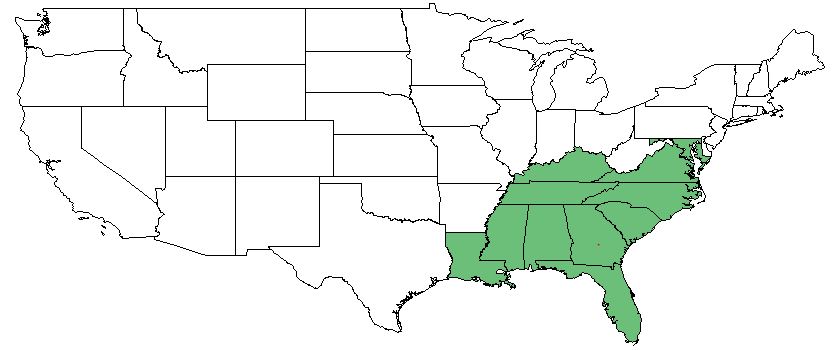Difference between revisions of "Dichanthelium tenue"
(→Taxonomic Notes) |
|||
| Line 18: | Line 18: | ||
}} | }} | ||
==Taxonomic Notes== | ==Taxonomic Notes== | ||
| − | Synonyms: ''Panicum tenue'' Muhlenberg, ''Panicum albomarginatum'' Nash, ''Panicum trifolium'' Nash, ''Panicum ensifolium'' Baldwin, ''Panicum concinnius A.S. Hitchcock & Chase, and ''Dichanthelium dichotomum'' (Linnaeus) Gould var. ''tenue'' (Muhlenberg) Gould & Clark. | + | Synonyms: ''Panicum tenue'' Muhlenberg, ''Panicum albomarginatum'' Nash, ''Panicum trifolium'' Nash, ''Panicum ensifolium'' Baldwin, ''Panicum concinnius'' A.S. Hitchcock & Chase, and ''Dichanthelium dichotomum'' (Linnaeus) Gould var. ''tenue'' (Muhlenberg) Gould & Clark. |
Varieties: none | Varieties: none | ||
Revision as of 13:38, 26 June 2018
| Dichanthelium tenue | |
|---|---|
| Scientific classification | |
| Kingdom: | Plantae |
| Division: | Magnoliophyta - Flowering plants |
| Class: | Liliopsida - Moncots |
| Order: | Poales |
| Family: | Poaceae |
| Genus: | Dichanthelium |
| Species: | D. tenue |
| Binomial name | |
| Dichanthelium tenue (Muhlenberg) | |

| |
| Natural range of Dichanthelium tenue from Weakley [1] | |
Contents
Taxonomic Notes
Synonyms: Panicum tenue Muhlenberg, Panicum albomarginatum Nash, Panicum trifolium Nash, Panicum ensifolium Baldwin, Panicum concinnius A.S. Hitchcock & Chase, and Dichanthelium dichotomum (Linnaeus) Gould var. tenue (Muhlenberg) Gould & Clark.
Varieties: none
Description
D. tenue, also known as white-edged witchgrass [2], is a native perennial with a graminoid growth habit that is a member of the Poaceae family. [3]
Distribution
The native distribution of D. tenue ranges in the gulf coastal plain from Louisiana up to Kentucky and Maryland. [3] The species is also present in Mesoamerica and Cuba. [2]
Ecology
Habitat
D. tenue can be found in wet peaty or sandy soil in pineland savannas, flatwoods, bogs, and meadows. [2] More specifically, habitats range from hardwood forests, pine flatwoods and savannahs, shaded loams, along railroads and several other disturbed sites, sandy depressions and hills, scrub thickets, grass sedge bogs, and other flatwoods. [4]
Phenology
Flowering time of D. tenue ranges from May until October. [2] Fruit has been seen to be present in the months February through June, and September through November. [4]
Conservation and Management
Cultivation and restoration
Photo Gallery
References and notes
- ↑ Weakley, Alan S. 2015. Flora of the Southern and Mid-Atlantic States: Working Draft of 21 May 2015. University of North Carolina, Chapel Hill, North Carolina. 1320 pp.
- ↑ 2.0 2.1 2.2 2.3 Weakley, A. S. (2015). Flora of the Southern and Mid-Atlantic States. Chapel Hill, NC, University of North Carolina Herbarium.
- ↑ 3.0 3.1 USDA Plants Database URL: https://plants.usda.gov/core/profile?symbol=DIDIT
- ↑ 4.0 4.1 Florida State University Robert K. Godfrey Herbarium database. URL: http://herbarium.bio.fsu.edu. Last accessed: June 2018. Collectors: Loran C. Anderson, Cecil Slaughter, R. Kral, R. K. Godfrey, H. Kurz, S. W. Leonard, A. E. Radford, Sidney McDaniel, C. R. Bell, H. L. Blomquist, R. F. Thorne, and R. A. Davidson. States and counties: Florida: Wakulla, Liberty, Franklin, Levy, Alachua, Escambia, Lee, Calhoun, Madison, Pasco, Jefferson, Dixie, Martin, Bay, and Leon. Louisiana: St Tammany, and Ouachita. Georgia: Grady, Thomas, Clinch, and Baker. Alabama: Mobile. North Carolina: Wake, Pender, and Durham. Mississippi: Winston. South Carolina: Florence.